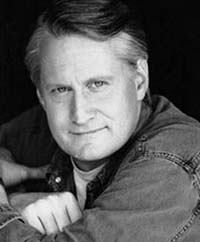Charles Martinet: Difference between revisions
Paper Jorge (talk | contribs) No edit summary |
Paper Jorge (talk | contribs) mNo edit summary |
||
| Line 1: | Line 1: | ||
[[Image:CharlesMartinet.jpg|thumb|'''Charles Martinet''', voice of [[Mario]].]] | [[Image:CharlesMartinet.jpg|thumb|'''Charles Martinet''', voice of [[Mario]].]] | ||
'''Charles Martinet''' (last name pronounced ''mar-tin-AY''), born September 17, 1955 in San Jose, California, is the prominent voice actor of the [[Mario (series)|Mario]] games. He plays the major characters [[Mario]] and [[Luigi]] (as well as their baby counterparts), [[Wario]] and [[Waluigi]], and [[Toadsworth]]; as well as minor characters such as [[Wart]] and other [[bosses]] from ''[[Super Mario Bros.]]. Martinet plays the vast majority of the male characters in the Mario series. [http://www.imdb.com/name/nm0553409/ The Internet Movie Database] attributes over 70 works to Martinet in total. Martinet speaks fluent French and Spanish, but, ironically, only a little Italian. | '''Charles Martinet''' (last name pronounced ''mar-tin-AY''), born September 17, 1955 in San Jose, California, is the prominent voice actor of the [[Mario (series)|Mario]] games. He plays the major characters [[Mario]] and [[Luigi]] (as well as their baby counterparts), [[Wario]] and [[Waluigi]], and [[Toadsworth]]; as well as minor characters such as [[Wart]] and other [[bosses]] from ''[[Super Mario Bros. 2]]''. Martinet plays the vast majority of the male characters in the Mario series. [http://www.imdb.com/name/nm0553409/ The Internet Movie Database] attributes over 70 works to Martinet in total. Martinet speaks fluent French and Spanish, but, ironically, only a little Italian. | ||
Martinet's first job voicing Mario began in 1994, when he would have motion sensors hooked to his face, which would interpret his facial movements to a computer-generated Mario head on a screen. Martinet would watch those passing by the screen through a surveillance camera and could talk to them, as Mario. This was used rather often by Nintendo when attending trade shows. An altered form of Mario In Real Time (MIRT) appeared in 1995's ''[[Mario's FUNdamentals]]'', with Martinet's voice, though most consider Mario's voice debut to be ''[[Super Mario 64]]'' in 1996. | Martinet's first job voicing Mario began in 1994, when he would have motion sensors hooked to his face, which would interpret his facial movements to a computer-generated Mario head on a screen. Martinet would watch those passing by the screen through a surveillance camera and could talk to them, as Mario. This was used rather often by Nintendo when attending trade shows. An altered form of Mario In Real Time (MIRT) appeared in 1995's ''[[Mario's FUNdamentals]]'', with Martinet's voice, though most consider Mario's voice debut to be ''[[Super Mario 64]]'' in 1996. | ||
Revision as of 23:00, September 6, 2008

Charles Martinet (last name pronounced mar-tin-AY), born September 17, 1955 in San Jose, California, is the prominent voice actor of the Mario games. He plays the major characters Mario and Luigi (as well as their baby counterparts), Wario and Waluigi, and Toadsworth; as well as minor characters such as Wart and other bosses from Super Mario Bros. 2. Martinet plays the vast majority of the male characters in the Mario series. The Internet Movie Database attributes over 70 works to Martinet in total. Martinet speaks fluent French and Spanish, but, ironically, only a little Italian.
Martinet's first job voicing Mario began in 1994, when he would have motion sensors hooked to his face, which would interpret his facial movements to a computer-generated Mario head on a screen. Martinet would watch those passing by the screen through a surveillance camera and could talk to them, as Mario. This was used rather often by Nintendo when attending trade shows. An altered form of Mario In Real Time (MIRT) appeared in 1995's Mario's FUNdamentals, with Martinet's voice, though most consider Mario's voice debut to be Super Mario 64 in 1996.